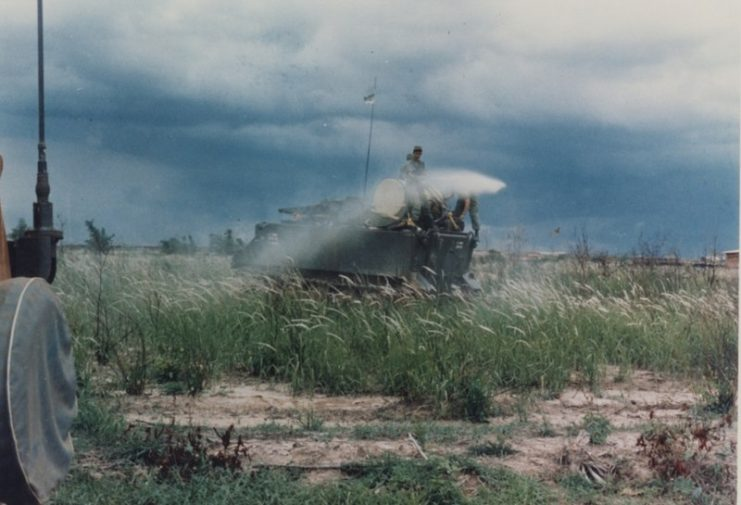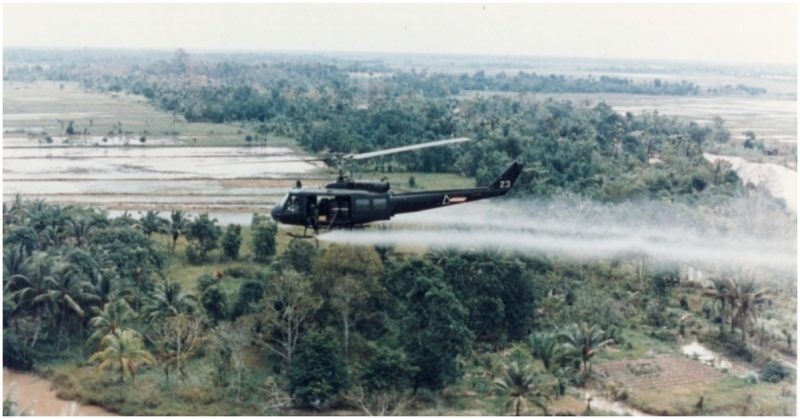During the Vietnam War, the United States military sprayed over twenty million gallons of herbicide Agent Orange on the trees and vegetation in Vietnam. The idea was to remove the forest cover that the enemy combatants were hiding behind and to destroy their crops, which would make it more difficult for them to feed themselves.
The primary herbicide used at the time was known as Agent Orange due to the colored band around its barrels. It was spread over Vietnam, the Korean Demilitarized Zone and Thai Air Force bases.

It was later determined that the chemicals contained in the herbicide caused many serious health issues including cancer, birth defects, rashes, psychological problems and neurological issues. These medical issues have been found both in Vietnamese citizens and returning US military members.
In 1979, a class action suit was filed on behalf of 2.4 million veterans who had been exposed to Agent Orange while serving in Vietnam.
Five years later, seven chemical companies that produced the herbicide agreed to a settlement which paid $180 million to the veterans or their next of kin. By the time the various legal challenges were resolved, the settlement had risen to approximately $240 million, including interest.

In 1991, President George H.W. Bush signed a law that required certain diseases associated with Agent Orange by treated as a result of service during war time. This cleared the way for veterans to be treated for these diseases by the US Department of Veterans Affairs.
Two years ago, David Shulkin was the Veteran Affairs Secretary. He tried to include three more health conditions – bladder cancer, Parkinson’s-like symptoms and hypthyroidism – as eligible diseases for Agent Orange benefits. This would have allowed veterans quicker access to compensation for disability compensation and to medical benefits.
Recently released emails show that the Office of Management and Budget (OMB) along with other White House officials objected to the proposed changes.
The specifics of the OMB’s challenges are redacted. The visible sections of the documentation indicate that the office had concerns with how the expanded benefits would impact the budget and whether there would be any adverse effect on the existing disability program.

The documents state that there are around 83,000 veterans who are affected by one of the three conditions that Shulkin proposed adding. The cost of providing benefits to these veterans was included in the documents but was redacted.
In 2016, scientists at the Institute of Medicine which is now known as the National Academies of Sciences, Engineering and Medicine determined that there was limited evidence that the three medical conditions were linked to Agent Orange.
There was some debate at the time as to whether Shulkin had the authority to decide to add the conditions. The Agent Orange Act of 1991 had expired before his decision. Shulkin pointed to similar decisions by previous secretaries of the VA such as approving ALS and osteoporosis benefits for former prisoners of war.
In 2018, President Donald Trump fired Shulkin after it was reported that Shulkin had accepted tickets to Wimbledon during an official trip to England.
Since then, there seems to have been no forward motion on adding these conditions to the medical benefits of veterans. This leaves hundreds of thousands of US veterans waiting in limbo to find out if they will be able to afford treatment for their medical conditions.
Another Article From Us: Shooting Vietnam – Review by Mark Barnes
Shulkin recently gave an interview in which he stated that the current process is backwards. He believes that the country should do all they can to support the veterans and if new discoveries are made, then policy should be changed. As it is, veterans are forced to wait until policymakers are convinced the evidence is irrefutable.
